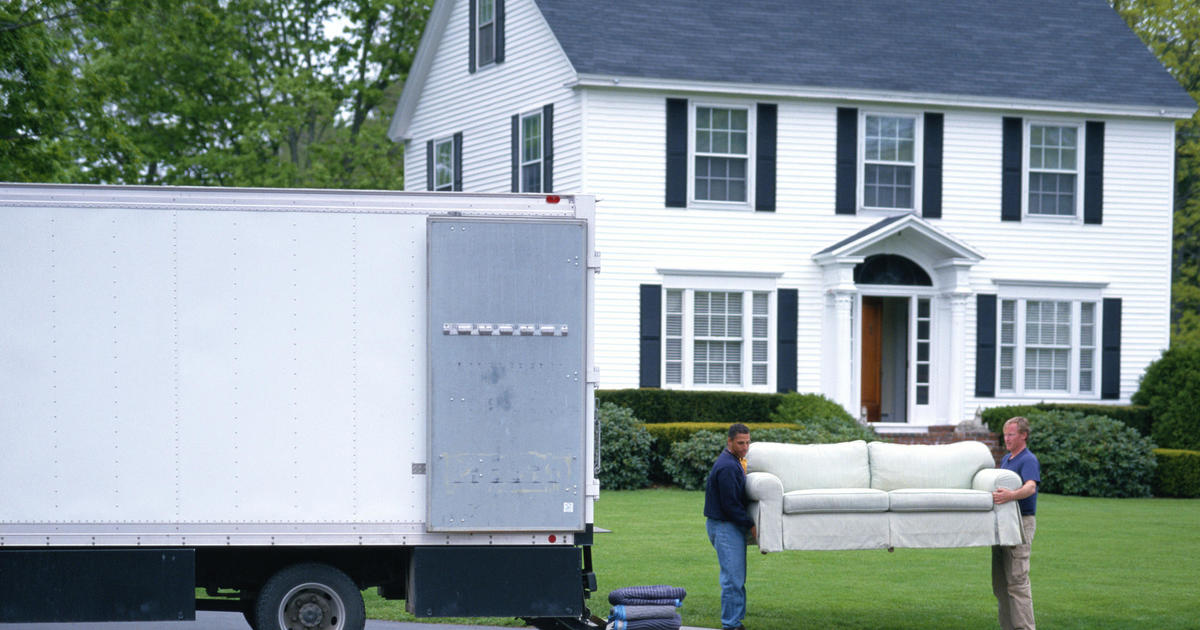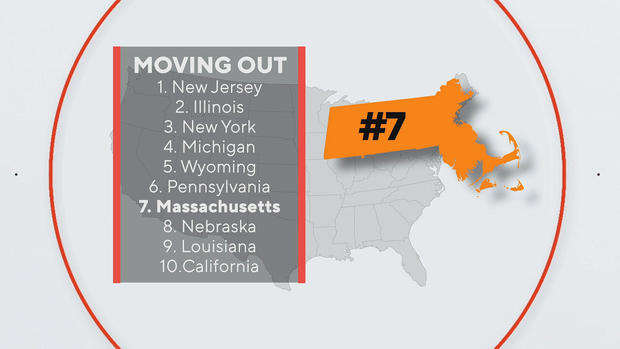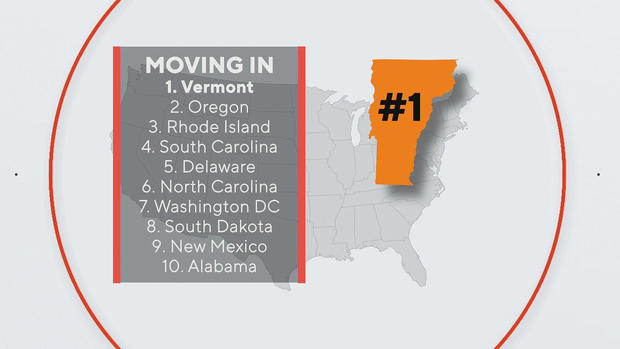Massachusetts
Why are more people moving out of Massachusetts than in?

BOSTON – From Boston to the Berkshires, Massachusetts is wicked awesome.
Rebecca Connell thinks so. The married mother of two from Virginia thought she might be a lifer but she and her husband are leaving Boston after living here for 12 years.
“It’s bittersweet, I would have to say. I love this city,” she told WBZ-TV.
Her family also loves the outdoors, so they’re building a home in Vermont. There’s lots of land and a mortgage that’s not a lot more than their rent in Roxbury.
“Massachusetts is expensive. Not to say that Vermont is less expensive but you get more for what you pay,” Connell said.
United Van Lines has been tracking migration patterns for 45 years. The moving company’s most recent study ranked Massachusetts seventh on the top 10 list of “most moved from” states. Four of the top 10 are in the northeast.
“A lot of northeastern traffic, we see a lot of migration not only to Florida but also to states like North Carolina and South Carolina.” United Van Lines spokesperson Eily Cummings told WBZ.
Massachusetts has a 56 percent outbound rate. That means for every 100 people that come and go, 56 are leaving, while only 44 are coming in. The company also surveys customers about why they’re grabbing the moving boxes. When it comes to these statistics, there’s a lot to unpack.
- 36% said that they wanted to move closer to family.
- 26% mentioned a new job
- 22% cited retirement
- 18% said they were looking for a better lifestyle.
- 11% said it was about the cost of living
I asked two former Massachusetts residents, Cathy, who moved to Arizona, and Ezra, who moved to North Carolina, to tell me what they like about where they are now.
“When it came time for us to retire, we realized we were not going to be able to afford to live there on our retirement income,” Cathy told me.
She and her husband Mike bought a home in Mesa. It cost them $200,000 less than in Massachusetts. Cathy misses the Red Sox, but loves the red rocks.
“What I like about living in Arizona is of course, number one the cost, number two the weather,” she said. “You don’t shovel sunshine!”
“I’m saying this literally that a one bedroom in Southie translates to a 5-bedroom house here, at least where I live,” Ezra Dyer told me.
He is a senior editor at Car and Driver magazine. His family moved to North Carolina after a tough Boston winter.
“It’s like bizarro Massachusetts. You’ve got beaches and mountains and cities and sports teams, but without the traffic, much lower cost of living. People are generally friendlier,” Dyer said.
The Carolinas are both in the top 10 of “most moved to” states, according to United Van Lines.
Vermont is number one and Rhode Island is third. People seem to want open space. Four of the 10 – Vermont, Oregon, South Dakota and New Mexico – are among the least densely populated states in the country. When people move to a city, they’re picking smaller ones.
“We are seeing a lot of migration to cities that have all the amenities of larger cities but an easier pace of life. So, you might see like a Knoxville, Tennessee or a Louisville, Kentucky, a Charlotte, North Carolina,” said Cummings.
The pandemic was also a factor. People were working from home and many didn’t stop. No office? No reason to live close by.
“I just wondered why am I doing this? Why am I shoveling snow at this point in my life? I work remotely anyway. Why not work remotely some place that has a much lower cost of living and better weather?,” Dyer said.
Rebecca is fully remote. She’ll change her address, but she’ll keep her job. She’s in IT and cybersecurity so she can work anywhere now. That wasn’t the case before the pandemic.
Rebecca, Cathy and Ezra all made the move, but all say Massachusetts will always be special to them.
“The Red Sox are playing in Arizona later this month and so I am going to get to a Red Sox game. That makes me very happy,” Cathy said.
“If someone waits in traffic here for two minutes at a rotary then they go nuts. They can’t believe that there’s so much traffic. I’m like, ‘Go sit on 93. Tell me three minutes is a lot of traffic,’” Dyer told me.
“It has given us as family so much and it will always be considered a home to me,” Connell said.
If you have a question you’d like us to look into, please email questioneverything@cbsboston.com.

Massachusetts
The Most Unusual Town in Massachusetts Has a Very Haunted History

Massachusetts has so much rich history throughout the state. Among that, there happens to be lots of haunted history. As it turns out, there is something extremely haunting that took place in a town within the Bay State that added to its resume as it earned the title of ‘most unusual town in Massachusetts’.
The entertainment publication ‘Alot’ has released a list of the most unusual towns in every state. It included towns with monuments, stories, traditions, and more that make these particular towns a little bit more abnormal or just a bit more odd than the average town for each state. In Massachusetts, the thing that makes it most unusual town is quite the haunting and terrifying tale.
What is the Most Unusual Town in Massachusetts?
In the southeast region of the Bay State, there is a city that happens to be the tenth-largest within the state of Massachusetts, which is known as Fall River.
Fall River is a city in Bristol County, Massachusetts, United States
As you have probably guessed, the reason for Fall River being selected as the most unusual town in Massachusetts is due to the Lizzie Borden House. Here’s what ‘Alot’ had to say about its pick for most unusual town in Massachusetts:
For those looking to scratch their true crime itch, Fall River — a small Massachusetts town — should rate highly on the bucket list. In 1892, the notorious murderer Lizzie Borden hacked her parents to death in this very town. These days, the site of these gruesome deaths is now a bed and breakfast.
Unsurprisingly, given its history, it also allegedly offers a wide range of paranormal activity to explore in addition to its macabre allure. So if you want a break from your regular activities while getting your fix of supernatural and spooky true-crime experiences, Fall River is definitely worth checking out!
In case you’re not exactly familiar with the legend of Lizzie Borden, ‘Travel’ provided a well written summary:
“Lizzie Borden took an ax, gave her mother 40 whacks…” well, her stepmother at least. Lizzie Borden may very well be America’s most infamous accused murderess. She was charged in 1892 for the brutal ax slaying of her father and stepmother, Andrew and Abby Borden, inside their family home. Though she was found not guilty, sleuths throughout history up to the present still try to puzzle out America’s famous who-done-it. Today, the site of the grizzly double murder is now a bed and breakfast and ghostly true-crime museum where doors are said to move on their own, shadowy figures move in the basement, and artifacts shift and change locations without anyone touching them.
And thanks in-large part to this haunting tale, Fall River is considered to be the most unusual town in Massachusetts. While being such an unusual town may not put it on everyone’s bucket list of stops, it’s definitely worth a visit for anyone in New England.
10 MA Towns That Don’t Sound Like They’re in Massachusetts
Gallery Credit: Google Maps
19 Massachusetts Towns That End In ‘ham’
Gallery Credit: Google Maps
Massachusetts
What do police in Massachusetts do with their guns when they’re not used anymore?

BOSTON – Guns that are used to protect the public are ending up on the other side of the law.
Records from the federal Bureau of Alcohol, Tobacco, Firearms show that over 16 years, more than 52,000 guns once owned by law enforcement later showed up at crime scenes. That means roughly 3,000 times a year, a police gun was used in the commission of a crime, sometimes with deadly results. WBZ-TV’s I-Team worked with CBS News in a partnership with non-profit newsrooms “The Trace” and “Reveal” on a special investigation into where old police weapons end up.
Boston mom Ruth Rollins wants to know. Her son Danny was shot and killed when he was 21.
“There were two young men, they were young teenagers that had something to do with my son’s murder, never left their housing development. I wanted to understand how these guns were ending up in our community,” said Rollins, who has since become an anti-gun violence advocate.
Guns sold legally
She was surprised to learn that most often, guns used in crimes originate from a legal transaction.
“Somebody buys guns legally and sells them to somebody that’s not able to purchase them legally, and it’s a business,” Rollins told WBZ.
Stopping guns from falling into the wrong hands is the inspiration behind police sponsored gun buybacks. It’s a subject Boston Police Commissioner Michael Cox speaks about passionately.
“We’re doing all we can to take as many off the streets,” he has said. But gun control advocates say what police do with their own guns works against that goal.
Massachusetts police sell or trade in guns
In collaboration with CBS News, the I-Team obtained records showing Massachusetts police departments typically and legally sell back or trade in their service weapons to dealers when they’re no longer of use to officers. This includes Massachusetts State Police, Worcester Police, and others.
Records show since 2000, Quincy Police traded 200 guns back to a dealer. Cambridge Police sold back 575 guns. Lynn Police sold back 205 and Lawrence Police sold back at least 140.
Over the border in Nashua, New Hampshire, records show, in the last couple decades, police sold at least 485 guns to eight different dealers across the country.
Records show Boston Police traded in 500 Glock 22 pistols three years ago. A spokesperson said it’s an effort “to reduce the cost to the city. Such transactions usually occur with the licensed firearm wholesalers that we are purchasing the new items from.”
But records from police departments across the country show some have sold guns to dealers even when they’re not buying replacements from them.
The cost of destroying old police guns
“That’s appalling. Those guns, they should not have been sold back to gun dealers. They needed to be destroyed,” Rollins told WBZ.
Boston Police invited her to watch how they shred guns they’ve confiscated. She thinks old police guns should meet the same fate. One community on Cape Cod is already doing just that.
“This is a step ahead, this is a victory,” said Tom Stone of the Falmouth Gun Safety Coalition. The group has spent years pushing for local police to destroy officers’ old guns. In April, the coalition finally got what it wanted. The town manager agreed to turn over 26 guns for Massachusetts State Police to destroy.
“My concern obviously is for the safety of Falmouth residents and visitors who come here,” Town Manager Mike Renshaw told WBZ. “We took steps to ensure that there was no possibility of any gun violence incident arising out of these 26 shotguns.”
That comes at a cost. In this case, Falmouth Police Chief Jeffrey Lourie said he could have saved more than $4,000 by selling the guns back.
“I just feel as a department head that I have a responsibility to the taxpayers,” he said.
Trade-in value for a donation
Falmouth Police have 70 additional guns worth as much as $20,000 they plan to get rid of later this year. Renshaw said he hasn’t decided yet whether to trade them in or destroy them. The select board enacted a new policy to publicly post the trade-in value of weapons when police replace them. If someone donates that amount, police can destroy the guns.
“It makes me feel good to know that we’re kind of on that leading edge,” said Renshaw.
Massachusetts
‘He loved to compete’: Tributes flow for Jim Ruschioni, one of Massachusetts’ finest amateur golfers who died Tuesday at age 76

Jason Ruschioni won plenty of golf tournaments with his father, Jim, one of the most successful amateur golfers in Massachusetts for the last several decades.
They finished first in the Mass. Four-Ball, the Mass. Father-Son and the Wachusett Four-Ball twice each. They won the Pleasant Valley Labor Day Four-Ball, the Crumpin-Fox Father’s Day Two-Ball and the Eastern States Four-Ball at Oak Ridge CC four times in a row. They prevailed in the Father-Son at Oak Hill CC in Fitchburg about 15 times.
“I never had that competitive edge or that spirit that he had,” Jason said, “but I used to play in those tournaments just because I got the opportunity to play with him.”
Winning the Wachusett Four-Ball for the first time in 1994 in a playoff stands out.
“That was the first time I had really seen a lot of emotion out of him,” Jason said. “That was probably the most special moment we shared together, not knowing that there were going to be several other victories after that.”
Jim was diagnosed last August with pancreatic and liver cancer and started chemotherapy shortly afterward. Tuesday night, he died at age 76 in the Leominster home where he had lived with his wife, Lynne, since 1974.
Jason played his final round with his father on Aug. 14 at Wachusett’s sister course, Kettle Brook GC in Paxton. Jason’s son, Colin, joined them just before he headed off to his freshman year at Coastal Carolina University in South Carolina. Colin shot 71, Jason shot 74, and Jim shot 76. It was the first time Colin had beaten his father and grandfather. Jim’s good friend, Jon Fasick, completed the foursome.
“I had a feeling deep down that that was probably going to be the last time that I played with him, and it was,” Jason said.
Jim’s list of achievements would be the envy of most golfers. Playing with Paul Nunez, he earned his 14th and final Mass. Golf tournament victory in 2021 in the Mass. Senior Four-Ball Super Senior Division for golfers ages 65 and older. He also won the New England Amateur in 1987 at Oak Hill and was twice a finalist in the Mass. Amateur.
He won the Wachusett Four-Ball seven times in all, and he captured three Worcester County Amateurs at Wachusett CC. He also won the Hornblower and the Cape Cod Senior Open. He shot his age more than 100 times.
Add to that the 18 club championships he earned at Oak Hill, the most by any man, the two at Monoosnock CC in Leominster and the three at Wachusett CC, becoming the club’s oldest club champion at 69 in 2019, 71 in 2017 and 73 in 2021.
No wonder he was known as “Mr. Oak Hill” at Oak Hill and as “The Legend” at Wachusett. The flags at both clubs were lowered to half-staff on Wednesday.
“He’s a legend in my opinion, not just for Massachusetts golf, but for New England golf in general,” said Nick Marrone, who owns Wachusett and Kettle Brook with his siblings and serves as director of golf at both. “Growing up, I looked at him like kids look at Tiger Woods and Scottie Scheffler. That’s how I looked at Jim Ruschioni when I was watching him play the four-balls.”
Jim O’Leary served as head pro at Oak Hill from 1964-2014 and still helps out at the club. He ranks Jim Ruschioni as the club’s greatest golfer.
“He was Mr. Oak Hill,” O’Leary said. “He was our club and he made our club better. He made every place better wherever he was. He made Wachusett a better place. He was a pied piper.”
Each year, the Marrone family awards a free membership to someone who represents the club well. It’s called the Don Marrone Quiet Man Award, named after the Marrones’ late father and one of his favorite John Wayne movies about his beloved Ireland. Last January, the Marrones emailed Jim to inform him they planned to give him the award in 2024.
In his email reply, Jim wrote in part, “I have always tried to treat people and the game of golf with the utmost respect on and off the course. I have had some of the best accomplishments and highlights of my career at Wachusett CC and I will never forget those times.”
Jason said his father had the proper attitude to be a great golfer.
“Just his temperament, the way he carried himself on the golf course,” Jason said. “His ability to not let bad shots bother him. He loved to compete. He had that edge to him. Everybody that he competed against hit it farther than him, but that didn’t bother him. If the weather was tough, he had that drive in him to compete, never give up and to take it one shot at a time.”
Jason admired his father even more off the course.
“He was great,” Jason said. “He was just the ultimate role model.”
Jim learned to play golf at Winchendon Golf Club where his father, Dino, was the superintendent. The family lived across the street from the 17th hole.
Jason has many great memories playing golf with his father. One of them that stands out is how he aimed almost backward to roll a 90-degree angle birdie putt up a hill on 17 at Wachusett and then he birdied 18 to win the Wachusett Four-Ball in 1995.
“His desire and his refusal to lose and refusal to quit,” Jason said, “that was one of my favorite golf moments playing with him.”
Jim also refused to quit after he was diagnosed with cancer.
“He battled for seven months of treatment,” Jason said. “The chemo really just took its toll on him. He was optimistic in March, and basically his wish was to get out there with Colin and I and play some golf whether it was nine holes or what.”
Unfortunately, he was informed later in March that his treatments weren’t working, and he entered managed care.
“He remained optimistic,” Jason said. “He wasn’t defeated. He has never been defeated in his entire life and just tried his best to get some kind of quality of life despite the fact that he had this cancer.”
Jason said the family received hundreds of text messages and emails of condolences the day after his father died, starting at 6 a.m.
Wachusett CC golf shop manager Don DiCarlo played a lot with Jim.
“Ridiculously consistent, probably one of the best putters I’ve ever seen,” DiCarlo said. “Definitely a great short game. Hit it consistently dead down the middle.”
Even when Jim didn’t play, he sometimes went to Wachusett to talk to his friends at the end of their rounds or walk a hole with them. He brought the pro shop staff doughnuts and muffins several times.
Paul Spongberg also played often with Jim at Wachusett.
“He just made it comfortable to play with him,” Spongberg said. “He was just an ambassador of the game, but he was very relaxed, made you relaxed. As long as you respected the game as much as he did, you’d have a great time.”
Spongberg said higher handicappers played better when playing with him, and he enjoyed offering tips to them.
Ruschioni worked for 31 years for General Electric in Fitchburg before retiring as a purchasing manager at age 51.
In addition to Jason, 50, of Princeton, the Ruschionis have another son, Michael, 46, who lives in Franklin. Jim is survived by five grandchildren.
“They said he dominated golf, but he dominated life as a father and a husband,” Marrone said.
Jesse Menachem, Mass Golf executive director and CEO, agreed that Jim was a legend.
“He’s a legend in the state, a gentleman, a friend,” Menachem said. “Partnering with his son, with his fellow club mates, and just always a consistent name and personality that people really enjoyed being around, being associated with.”
The Massachusetts Golf Hall of Fame is an exclusive club with only 22 members, but Jim can’t be ruled out as a future inductee.
“I think he is absolutely part of that conversation,” Menachem said.
It was sad, but fitting that he died on the night of the final day of the Mass. Senior Four-Ball. His good friends, Jon Fasick of New England CC and his twin brother Carter Fasick of Westborough CC, won the Super Senior Division for golfers ages 65 and older.
“I know it was quite emotional for them and also quite fitting,” Menachem said. “That’s a really incredible, ironic feat.”
Mike Kean played weekends with Jim at Wachusett for more than a decade. Kean said when he played in the Senior Four-Ball on Monday and Tuesday, about 50 golfers asked him how Jim was doing, and they all told stories about how gracious he had been to them.
“He’s a legend,” Kean said. “The nicest guy in the world. Competitive. He wanted to win, but always the classiest guy you’d ever meet. Obviously, he won a lot, but he’d play with anyone.”
Kean said Jim set four rules when he played at Wachusett, called the four P’s, when they played for money. They were “play fast, putt out, post your score and pay up.”
O’Leary said whether your handicap was 1 or 31, it didn’t matter to Ruschioni. He wanted to get to know everyone’s name.
“He was a great golfer and a better person,” O’Leary said. “He was humble and kind.”
Ideas always welcome
You can suggest story ideas for this golf column by reaching me at the email listed below. Comments are also welcome.
—Contact Bill Doyle at bcdoyle15@charter.net. Follow him on X, formerly known as Twitter @BillDoyle15.
-

 World1 week ago
World1 week agoPentagon chief confirms US pause on weapons shipment to Israel
-

 Politics1 week ago
Politics1 week agoRFK Jr said a worm ate part of his brain and died in his head
-

 Politics1 week ago
Politics1 week agoOhio AG defends letter warning 'woke' masked anti-Israel protesters they face prison time: 'We have a society'
-

 News1 week ago
News1 week agoNine Things We Learned From TikTok’s Lawsuit Against The US Government
-

 Politics1 week ago
Politics1 week agoBiden’s decision to pull Israel weapons shipment kept quiet until after Holocaust remembrance address: report
-

 Education1 week ago
Education1 week agoVideo: Police Use Pepper Spray on Protesters on G.W.U.’s Campus
-

 World1 week ago
World1 week agoA look at Chinese investment within Hungary
-

 News1 week ago
News1 week agoThe Major Supreme Court Cases of 2024
























